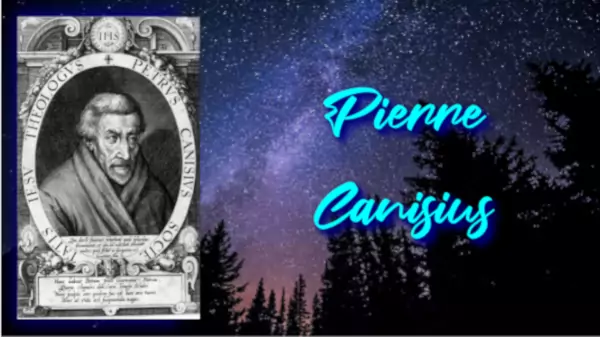21 December - Saint Peter Canisius, also known as Peter Kanis, was born on 8 May 1521 in Nijmegen. His father, Jacob Kanis, a wealthy bourgeois, was elected nine times burgomaster of the city. He lost his mother, Ægidia van Houweningen, shortly after his birth.
In 1536, Peter, aged 15, was sent to Cologne to study "arts" and civil law among other subjects. As he matured the decision to become a priest, he oriented his theological studies towards Holy Scripture and the Fathers of the Church. He spent part of 1539 at the University of Leuven, and in 1540 he was awarded a Master of Arts degree in Cologne. In the spring of 1543, he met Pierre Favre, Ignatius of Loyola's first companion, who was commissioned by the Pope to stay in Mainz. Under his guidance, he completed the Spiritual Exercises for thirty days. He decides to enter the Society of Jesus, where he is admitted on May 8 to St. Christopher in Mainz. With the support of the Carthusian monks of the Carthusian monastery in Cologne, he then founds the first house of the Society of Jesus in Germany. In 1546, Peter Canisius was ordained a priest and shortly afterwards left Cologne for Italy. The following year, he took part in the Council of Trent as the theologian of the Cardinal-Bishop of Augsburg Othon Truchsess von Waldburg. Ignatius called him back to Rome and had him complete his novitiate under his own direction. In the spring of 1548, he was sent to Messina, with a group of ten Jesuits under the direction of Jerome Nadal, to found the first college of the Society. There he taught Latin and rhetoric.
In 1549, Pope Paul III, responding to a request from Duke William IV of Bavaria, sent him to teach at the University of Ingolstadt in Bavaria. On 7 September 1549, he took his solemn vows in Rome, in the hands of Ignatius of Loyola. Then, in Bologna, he was awarded the degree of Doctor of Theology. In 1550, he was elected rector of the University of Ingolstadt. In 1552, Ignatius sent him to the new college in Vienna; he also preached at St. Stephen's Cathedral and at the court of Ferdinand I. He repeatedly refused the archbishopric of Vienna despite Ferdinand's insistent requests to Pope Julius III. In the winter of 1556-57, he became an adviser to the king of the Romans. Appointed by the Catholic princes and on the orders of the Pope, he took part in the religious colloquia held in Worms. As a champion of the Catholic party, he frequently opposed Melanchthon. The Protestants split and had to withdraw, largely because of him. In 1556, Ignatius of Loyola appointed Canisius "Provincial Superior" of the Jesuits of Upper Germany, including Swabia, Bavaria, Bohemia, Hungary, Upper and Lower Austria. In 1554, he wrote an excellent précis for the teaching of religion: Summa doctrinae christianae..., known as the Great Catechism. He himself gives an abridged version of this work, the Small Catechism for Children, which was quickly popular. He translates the Fathers of the Church, too forgotten at the time. Although he fought against the doctrines of the Reformation, he was full of consideration for the Protestant reformers. Aware of the weaknesses of the Catholic Church, he is convinced that the "renewal" of the Church, a term he prefers to reform, must go through the fight against the ignorance of the clergy and the faithful. He spent the last years of his life in Fribourg, where he died on 21 December 1597. Peter Canisius was beatified by Pius IX on 23 November 1864, then declared Doctor of the Church and canonised by Pius XI on 21 May 1925, Ascension Day, in Rome.








